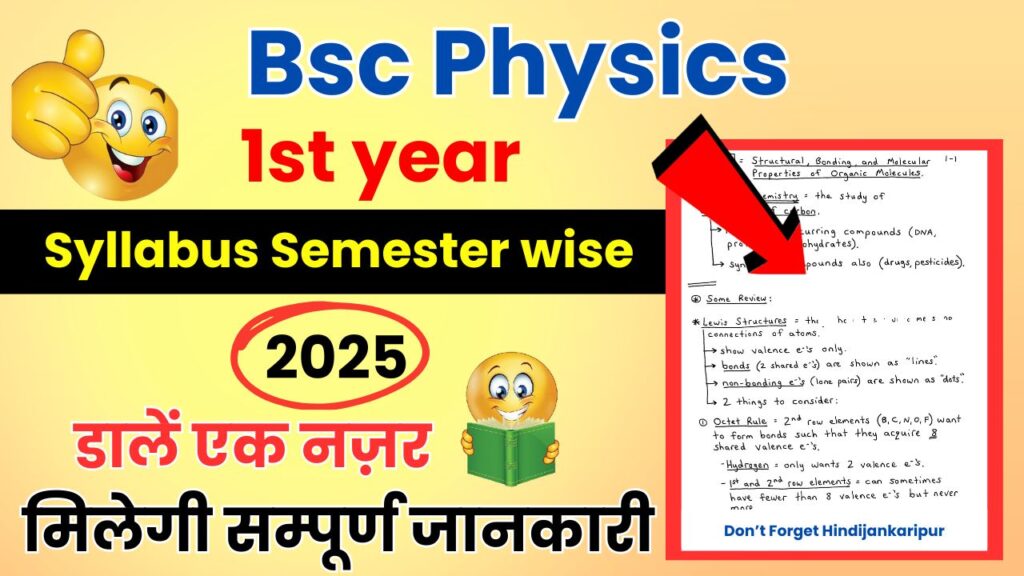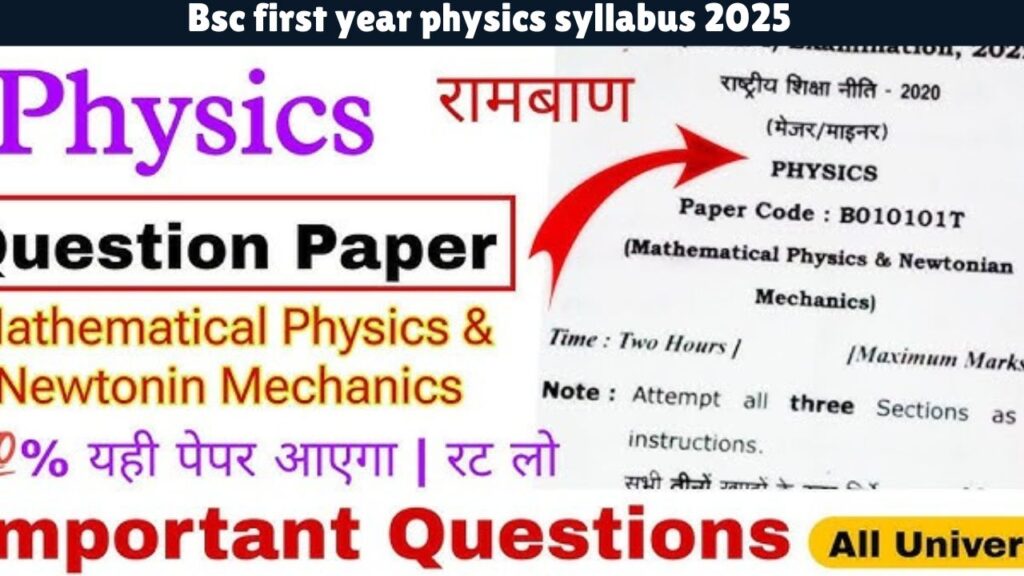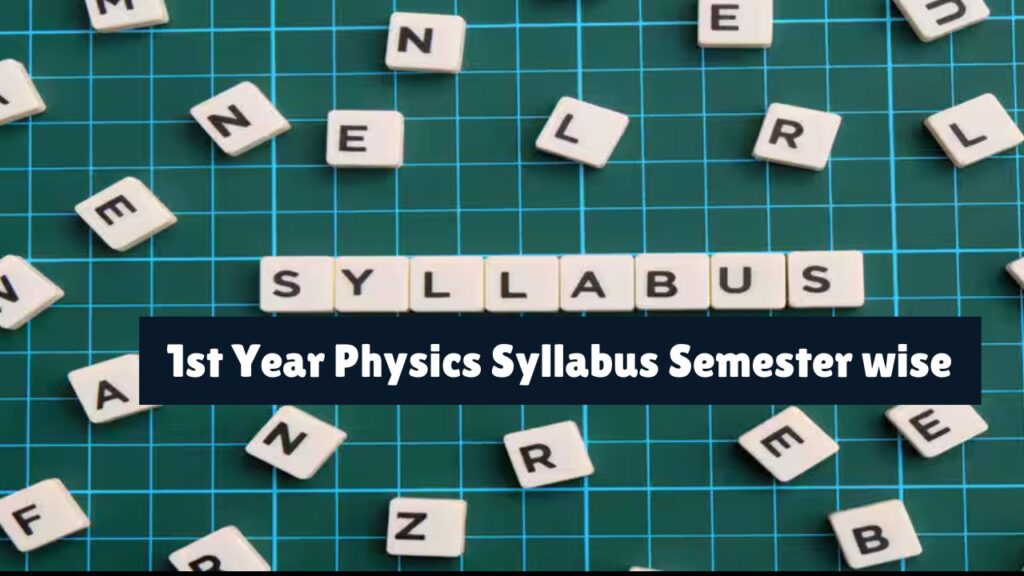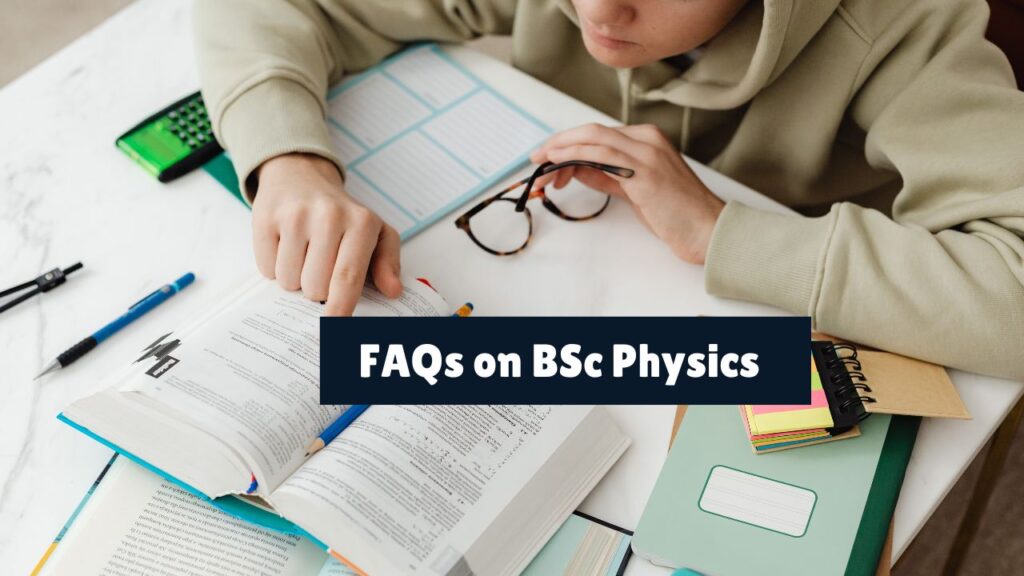Do You Know Bsc first year physics syllabus 2025. The Education Authorities can make changes in syllabus at any time. Checking the latest bsc Physics syllabus pdf is important.

Studying According to b sc 1st Year Physics Syllabus Semester wise for your Future exam Can Help You to lesser the burden.
Students in this post we will share with you latest Bsc Physics Syllabus shared by official sources Semester Wise. Do Read This Post till end.
Contents
Bsc first year physics syllabus 2025

BSc Physics (Hons.) is a three-year undergraduate program divided into six semesters. The course provides advanced knowledge of physics topics through theory and practical experiments. It emphasizes areas such as Classical Mechanics, Quantum Mechanics, Electromagnetism, and more. Graduates from this program are well-equipped for roles in research, industry, and higher education.
Key highlights:
- Duration: 3 Years (6 Semesters)
- Core Focus: Advanced physics theories and applications
- Major Recruiters: ISRO, DRDO, BARC, and research institutes
Year-wise Syllabus Overview
The BSc Physics (Hons.) syllabus is structured year-wise to build a strong foundation and progressively introduce advanced concepts. Below is an outline of the curriculum:
- First Year: Fundamentals of physics, mathematical applications, and introductory laboratory experiments.
- Second Year: Advanced topics in quantum physics, statistical mechanics, and electronics.
- Third Year: Specialized topics, research projects, and practical applications.
1st Year Physics Syllabus Semester wise

The first-year syllabus aims to strengthen foundational concepts. Here are the core subjects divided by semester:
Semester 1
- Mechanics and Properties of Matter
- Study of forces, energy, and motion.
- Electricity and Magnetism
- Fundamentals of electric fields, magnetic fields, and circuits.
- Mathematical Physics I
- Application of calculus, matrices, and differential equations in physics.
- Thermodynamics
- Basics of heat, energy transfer, and thermodynamic laws.
- Computer Programming
- Introduction to programming languages for physics simulations.
Semester 2
- Theory of Relativity
- Basics of Einstein’s theory of relativity and its applications.
- Classical Mechanics
- Concepts of motion, conservation laws, and dynamics.
- Semiconductor Devices
- Working principles and applications of semiconductors.
- Waves and Optics I
- Study of wave behavior, diffraction, and interference.
- General Electives 1 & 2
- Courses chosen from interdisciplinary subjects.
Laboratory Practicals
Hands-on experiments reinforce theoretical knowledge. First-year practicals include:
- Physics-I Lab: Experiments on mechanics and thermodynamics.
- Waves and Optics Lab: Practical study of wave interference and diffraction.
- Physical Chemistry Lab I: Experiments on chemical properties and kinetics.
Key Books for First-Year Students
Here is a list of essential textbooks to master the first-year syllabus:
- Berkeley Physics Course by Edward Mills Purcell
- Introduction to Electrodynamics by David J. Griffiths
- Classical Dynamics of Particles and Systems by S.T. Thornton & J.B. Marion
- Fundamentals of Optics by Francis Jenkins
- General Properties of Matter by F.H. Newman & V.H.L. Searle
Teaching Techniques and Methodologies
The BSc Physics (Hons.) course employs a variety of teaching methods to enhance student understanding:
- Classroom Instruction: Theoretical lectures to explain fundamental concepts.
- Laboratory Work: Practical experiments to apply theoretical knowledge.
- Group Discussions: Collaborative discussions on advanced topics.
- Assignments and Viva Voce: Regular assessments to evaluate understanding.
Career Opportunities After BSc Physics (Hons.)
Graduates of BSc Physics (Hons.) have access to diverse career options in research, education, and industry. Common job roles include:
- Physicist
- Research Associate
- Lab Technician
- Radiologist Assistant
- Physics Educator
Top employers:
- Indian Space Research Organisation (ISRO)
- Bhabha Atomic Research Centre (BARC)
- Defence Research and Development Organisation (DRDO)
FAQs on BSc Physics

Is BSc Physics (Hons.) tough?
Yes, it is a challenging course due to its focus on advanced theories and complex practicals.
What electives can I choose in BSc Physics (Hons.)?
Electives include Astrophysics, Advanced Dynamics, and Computer Science.
What is the average salary for BSc Physics (Hons.) graduates?
The average salary ranges between INR 3,00,000 and 6,50,000 per annum.
Which colleges are best for BSc Physics (Hons.)?
Top colleges include Lovely Professional University, Amity University, and Maharishi Markandeshwar University.
Also Read: BSC Maths Syllabus 1st year
We hope that with the help of this article you would have got information about Bsc first year physics syllabus 2025.
Friends, how did you like this post, please let us know in the comment section and if you have any questions, then feel free to ask us in the comment box. If you found this post useful please share it with others.